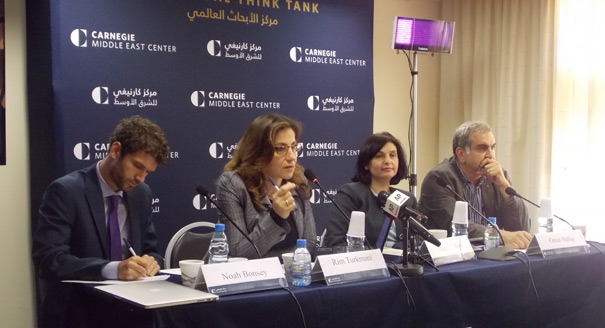Registration
You will receive an email confirming your registration.
The conflict in Syria has killed more than 190,000 people and pushed more than three million Syrians to seek refuge in neighboring countries. As the war in Syria shows no sign of abating, international efforts to hasten a political continue to stall. However, localized efforts to reach truces and ceasefire agreements inside the country have become the subject of increasing international attention. While fraught with pitfalls and open to manipulation, these local efforts could offer hope to civilians and reduce human suffering if properly supported and implemented.
Carnegie Middle East Center, in partnership with Oxfam, presented the new report Hungry for Peace: Positives and Pitfalls of Local Truces and Ceasefires in Syria, an in-depth academic analysis of local peace initiatives by the Syrian organization Madani and the London School of Economics and Political Science.
Speakers discussed the ongoing dynamics of the Syria war, the possibilities for a homegrown peace process, and the elements needed for this to happen. They also offered a series of recommendations for an integrated framework that could support the achievement of sustainable peace in Syria.
About the Report
The report analyzes both top-down attempts at negotiation as well as more than 35 different local negotiations across Syria, between October 2011 and the present time. It was written using information gathered by field researchers inside the country and from 45 interviews with civil society and political actors across conflict lines. It includes case studies from Homs, the Damascus countryside, Ras al-Ain, and the provision of services in Dara’a and Aleppo.
International and Regional Dynamics
- International Actors: One of the major problems facing the implementation of local ceasefire agreements is the lack of third party negotiators and observers, like the United Nations, said Rim Turkmani, founder of Madani. He added that international funders must be careful about where they direct their funding on the ground, in order to avoid inadvertently supporting war profiteers.
- Geneva Peace Talks: The opposition “leadership” frequently has little to no power or representation on the ground, said professor Omar Hallaj. Efforts such as the Geneva peace talks will always be crippled because of this ineffectiveness. Until international actors can act more locally and in a depoliticized way they will only be able to affect top down processes, warned Hallaj.
Local Dynamics
- Local-level Talks: Preventing an ongoing cycle of violence should be one of the main goals of any ceasefire agreement, said Carnegie’s Maha Yahya. Even though top-down talks are failing, local-level talks are constantly ongoing, even between actors who refuse to talk at the higher level, such as Iran, added Turkmani. He said that some of these truces are not necessarily related to a cessation in fighting but to providing services, such as allowing state civil service employees to continue providing water, power, or food.
- Depoliticization: With all of the major forces in the conflict attempting to control any peace process, involvement of more local actors will ensure that one actor does not become the primary stakeholder, said Hallaj. However, the process must first be depoliticized by legitimizing local councils, using existing legal frameworks, and creating ways for local councils to become major stakeholders in the peace process, he explained.
Potential Pitfalls
- Negative Track Record: The overall track record for ceasefires in Syria is negative. The primary reason is that the Syrian regime has used them as a pillar of military strategy, said Noah Bonsey of the International Crisis Group.
- Brink of Victory: There is a tendency on both sides to believe that they are close to victory and thus refuse to engage with the peace process, Bonsey added. As long as all stakeholders believe that victory is within their grasp, there is no incentive to make equitable ceasefires, he concluded.
Noah Bonsey
Noah Bonsey is a senior analyst at the International Crisis Group. Bonsey has contributed to Crisis Group’s coverage of Syria since May 2012, including the reports Anything But Politics: The State of Syria’s Political Opposition and Tentative Jihad: Syria’s Fundamentalist Opposition.
Omar Hallaj
Omar Hallaj is the former CEO of the Syria Trust for Development, and is currently visiting assistant professor at the Faculty of Architecture and Design in Beirut. He is active in a number of Syrian civil society initiatives.
Rim Turkmani
Rim Turkmani is an astrophysicist and the founder of Madani, a UK-based based NGO that promotes the role of Syrian civil society in state-building. She is a main author of the LSE-Madani report Hungry for Peace: Positives and Drawbacks of Local Truces and Ceasefires in Syria.
Maha Yahya
Maha Yahya is a senior associate at the Carnegie Middle East Center, where her research focuses on citizenship, pluralism, and social justice in the aftermath of the Arab uprisings.
